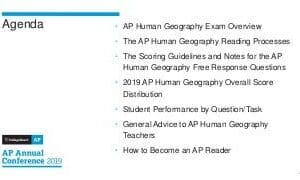
AP Human Geography (200)
The AP Human Geography 200 Multiple Choice Questions (MCQ) exam is not an easy test to take. However, a strategic mindset can help you score a 3, 4, or 5 on the test. The questions on the exam will cover various topics, from the classification of diffusion to applying geography models to hypothetical scenarios.
A good way to prepare for the test is to develop a study plan and stick to it.
Simulated exam questions
The simulated exam questions will cover a variety of topics. They will ask students to select the most relevant explanation for a geographic phenomenon. They will required to apply general terminology. In addition, they will ask students to interpret graphic data and theories. The AP(r) Human Geography multiple-choice questions will include a Key Takeaway section that summarizes the main learning point and will give clear, concise answers.
To prepare for the AP Human Geography 200 Multiple Choice Questions, students should familiarize themselves with the concepts taught during the class. Ensure that they have an understanding of the different terms and concepts. Additionally, make sure that know what meant by “economy” and “politics” in AP Human Geography. This will help you make the best decisions on your exam. By practicing with a simulated AP Human geography exam, you will be well prepared for the real exam.
AP Human Geography multiple-choice questions can include topics that students learned about during the course. Some simulated exam questions involve students choosing the best explanation of a geographical phenomenon, while others intended to challenge students’ understanding of general concepts. The AP Human Geography 200 MCQs will contain graphic data and general terminology. The simulated test will also ask students to apply their knowledge of geography to issues around the world.
Topics of questions
AP Human Geography 200 multiple-choice questions cover a variety of topics. In addition to definitions of terms, AP Human geography multiple-choice questions often ask students to identify different geographical phenomena and apply them to real-world problems. There simulated exams for AP Human geography with a variety of topics, including land, sea, ocean, and world climate. You can practice a wide range of AP(r) human geography MCQ subjects to ensure you have the right preparation for the AP(r) exam.
How divided AP(r) Human geography questions?
The AP(r) Human geography multiple-choice questions will be divided into several categories. Some of these will involve defining terms and concepts. Other multiple-choice questions will ask students to apply concepts to real-world issues. Moreover, they may also include graphic data and a Key Takeaway. This helps the student to choose the correct answer. They will have an easier time completing the exam if they practice regularly.
When preparing for the AP Human geography 200 MCQ, it is important to practice and master the topic. You should try to answer as many questions as you can.
If you’re not sure about an answer, you should read the questions carefully to ensure you know the information you’re memorizing. You should be able to choose the best answer in a few minutes. When you finish practicing, you’ll feel confident.
AP Human geography multiple-choice questions will cover a wide range of topics. They will ask students to define terms and pick the most appropriate explanations of geographical phenomena.
In addition, they will be asked to apply these concepts to real-world problems. You will have to choose the best answer among the possible answers. You can make the right choice by keeping the above-mentioned tips in mind.
As you study for the AP Human geography exam, you’ll be tested on a wide range of topics. The multiple-choice questions can include defining terms, selecting the best explanations for geographic phenomena, or applying concepts to a geographical issue. They will also include graphics and graphic data.
The AP human geography exam is difficult enough. It is essential to study and practice a variety of topics to prepare for it.


Comments (0)